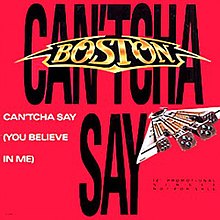Can'tcha Say (You Believe in Me)
| "Can'tcha Say (You Believe in Me)" | ||||
|---|---|---|---|---|
 | ||||
| Single by Boston | ||||
| from the album Third Stage | ||||
| B-side | "Cool the Engines" | |||
| Released | February 1987[1] | |||
| Recorded | 1981–1983 | |||
| Studio | Hideaway Studios | |||
| Genre | Rock | |||
| Length | 3:58 | |||
| Label | MCA | |||
| Songwriter(s) | Tom Scholz | |||
| Producer(s) | Tom Scholz | |||
| Boston singles chronology | ||||
| ||||
| Audio | ||||
| "Can'tcha Say (You Believe in Me)" on YouTube | ||||
"Can'tcha Say (You Believe in Me)", also known as "Can'tcha Say (You Believe in Me)/Still in Love" or "Can'tcha Say" is a song written by Tom Scholz that was released by Boston on their 1986 album Third Stage. It was released as the third single from the album and reached #20 on the Billboard Hot 100, making it their last Top 40 hit in the United States.[2] It also reached #7 on the Billboard Mainstream Rock chart and #27 on the Cashbox chart.[3] In Canada, the song peaked at #88.[4]
Although not released until 1986, Boston recorded "Can'tcha Say (You Believe in Me)" over 1981, 1982 and 1983.[5] The released version seamlessly combines what were originally separate songs.[6] According to the Third Stage liner notes, the song is about a reunion.[5] Scholz used the Rockman amplifier he invented to produce an effect in which the electric guitars sound like violins.[5][7] "Can'tcha Say (You Believe in Me)" was the first song on which Scholz recorded his guitar part using a Rockman, in conjunction with a ten band equalizer for changing sounds.[8]
Boston Phoenix critic Milo Miles criticizes "Can'tcha Say (You Believe in Me)" as "tedium."[9] He singles out the line "Where there's a will there's a way" as an example of the song's "prosaic, cliched lyrics."[9] However, Billboard regarded the song as one of the "best bets" to follow up on the success of the #1 single from Third Stage, "Amanda."[10] Cash Box praised Scholz' guitar playing and said that Brad Delp's vocals are "stacked to the sky" to give "an overall rock/choir effect."[11] Los Angeles Times critic Steve Pond praises the "persuasive" sound at the climax, which he likens to the sound of "a couple dozen guitars" revving up.[12] Jerry Spangler of the Deseret News praised the song as a ballad that sounds like a "sure-fire winner".[13] Paul Elliott of TeamRock.com rated it Boston's 8th greatest song.[6] Elliott said that this song along with "Still in Love" are "two great AOR songs in one."[14] Philip Booth of the Lakeland Ledger praises the song's "a cappella vocal opening."[15] Tom Alesia of The Wisconsin State Journal regards the song's title as Boston's worst.[16]
Despite its chart success, "Can'tcha Say (You Believe in Me)" was omitted from Boston's 1997 Greatest Hits album, for which the San Antonio Express criticized the package.[17]
Charts
[edit]| Chart (1987) | Peak position |
|---|---|
| Canada Top Singles (RPM)[18] | 88 |
| UK Singles (OCC)[19] | 82 |
| US Billboard Hot 100[20] | 20 |
| US Mainstream Rock (Billboard)[21] | 7 |
References
[edit]- ^ "Billboard entries for Boston".
- ^ "Boston Chart History: Hot 100". Billboard Magazine. Retrieved 2019-10-16.
- ^ Downey, P., Albert, G. & Hoffmann, F.W. (1994). Cash box pop singles charts, 1950-1993. University of Michigan. p. 34. ISBN 1563083167.
{{cite book}}: CS1 maint: multiple names: authors list (link) - ^ "RPM 100 Singles". 46 (4). Library and Archives Canada. May 2, 1987. Archived from the original on August 10, 2014. Retrieved 2013-08-11.
{{cite journal}}: Cite journal requires|journal=(help) - ^ a b c "Third Stage". Boston. Archived from the original on 2012-06-08. Retrieved 2013-08-11.
- ^ a b Elliott, Paul (March 10, 2016). "The 10 Greatest Boston Songs Ever". Future plc. Retrieved 2017-04-06.
- ^ Samuels, L. (August 26, 1986). "After Eight Years Boston Delivers More of the Same Old Bombast". Dallas Morning News. Retrieved 2013-08-11.
- ^ Stix, J. (July 1987). "Tom Scholz: A Normal Life". Guitar. pp. 46–53, 101.
- ^ a b Miles, M. (October 21, 1986). "Pop-Pourri". Boston Phoenix. p. 40. Retrieved 2013-08-11.
- ^ "Spotlight". Billboard Magazine. October 4, 1986. p. 78. Retrieved 2013-08-11.
- ^ "Single Releases" (PDF). Cash Box. March 7, 1987. p. 9. Retrieved 2022-08-08.
- ^ Pond, S. (October 5, 1986). "Boston Eight Years After". Los Angeles Times. p. 76. Retrieved 2013-08-11.
- ^ Spangler, J. (October 31, 2013). "Former Musical Kings Attempt to Climb Back to the Top". Deseret News. p. 8W. Retrieved 2013-08-11.
- ^ Elliott, Paul (March 9, 2022). "The Boston albums you should definitely own". Classic Rock. Louder Sound. Retrieved 2022-06-28.
- ^ Booth, P. (October 2, 1987). "Boston Proves a Point". Lakeland Ledger. p. 12. Retrieved 2013-08-11.
- ^ Alesia, T. (July 13, 2003). "Dinosaurs Rock Festival Near Eau Claire Becomes Haven for Fading Rockers". The Wisconsin State Journal. Archived from the original on March 4, 2016. Retrieved 2013-08-11 – via HighBeam.
- ^ "Don't Shoot! Give 'Greatest Hits' a Chance". San Antonio Express. August 1, 1997. Retrieved 2013-08-11.
- ^ "Top RPM Singles: Issue 0804." RPM. Library and Archives Canada. Retrieved 17 December 2022.
- ^ "Official Singles Chart Top 100". Official Charts Company. Retrieved 17 December 2022.
- ^ "Boston Chart History (Hot 100)". Billboard. Retrieved 17 December 2022.
- ^ "Boston Chart History (Mainstream Rock)". Billboard. Retrieved 17 December 2022.
